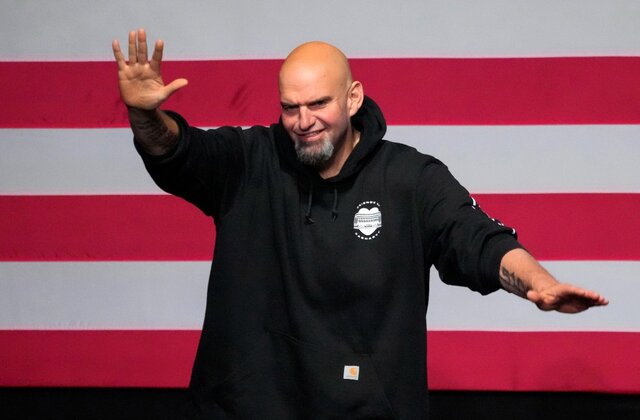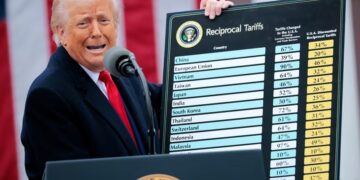By Hank Beckman, Opinion Contributor
Election day has come and gone, but it took us almost a week before we found out that we’re rerunning to the joint custody of Congress that Americans periodically prefer.
You’d think that the greatest nation in the world, with access to the finest universities, boatloads of capital, and the very best in technology, could figure out how to count votes in a timely fashion. Apparently that’s beyond our capabilities these days.
And it’s the understatement of the century to say that the Republican Party’s performance in the midterms was a disaster.
Inflation is the highest it’s been in 40 years; a sitting president’s approval numbers remain underwater; the Southern border is a mere suggestion; rising crime is making cities unlivable; and three-quarters of the American people believe we are on the wrong track.
If an opposition party in this political climate can’t take control of Congress from a party that already holds just a razor-thin majority, the opposition party has obvious problems.
Perhaps the low point of election night was the Republican candidate for Pennsylvania’s Senate seat losing to a recovering stroke victim who struggles to form coherent sentences and dresses like a guy who hangs around strip malls selling weed to teenagers.
And what should be just as blindingly obvious is that a huge part of the problem – maybe the biggest problem, is Donald John Trump.
Almost all of the important races with candidates Trump personally endorsed have lost; and they lost or underperformed in races where the opposing candidate was vulnerable.
If it’s not enough that we have to contend with Democrats importing millions of people from countries where the population routinely votes for leftist politicians (when they’re allowed to vote); a news media that functions as a public relations firm for Democrats; and tech overlords that routinely rig the flow of information to benefit leftist politician – we can no longer afford to be led by someone as toxic as the former president.
It might be true that Trump is a political phenomenon unlike any in American history – one that energizes the party’s base to an extent not seen since the days of Ronald Reagan. But it’s also true that he energizes the Democrat base like no other Republican.
Fairly or not, the fact is that an opposition that knows no ethical boundaries has been able to demonize Trump to a degree that we haven’t witnessed since Richard Nixon. Either man’s treatment by the left suffices as a prime example of liberal Democrat sleaziness.
Anyone is allowed a rookie mistake, but six years experience on the national political stage have apparently not taught him to to curb his intemperate impulses. In just the last few weeks, Trump has made despicable comments about GOP Senate Minority Leader Mitch McConnell’s wife Elaine Chao, calling her “McConnell’s China-loving wife, Coco Chow.”
No better were his off the wall comments on VA Gov. Glenn Youngkin’s name, tweeting “Young Kin, now that’s interesting. It sounds Chinese, Doesn’t it?”
If those comments about fellow Republicans weren’t bad enough, he couldn’t resist calling Florida Gov. Ron DeSantis “DeSanctimonious,” while claiming he is an average Republican governor with a great PR team.
What exactly is to be gained politically from crude comments about a person’s ethnicity? A prominent person in your own party, no less? What possible benefit can there be in confirming your enemy’s worst characterization of you, or, maybe more critically, the lingering fears of those who should be your natural allies based on policy preferences?
And the candidates most devoted to Trump have a tendency to sound just like him. What could Kari Lake have been thinking when she decided framing the late Sen. John McCain and his family as the enemy in this year’s election? Did anything good come out of calling John McCain a loser? Or railing on about the “McCain Machine?” What possible advantage was there in telling any McCain Republicans to get out of the room, as she did a few weeks ago? Maybe her advisors know something I don’t, but it doesn’t sound like the optimal way to close out a close election in Arizona.
A defining feature of the candidates Trump most publicly supported is that they stood by his claim that the 2020 election was stolen from him. It was really a prerequisite for his support.
There was a lot wrong with the way the 2020 election was conducted – too much to recount in this column. For a deep dive into the subject, one can do no better than Mollie Hemingway’s “Rigged: How the Media, Big Tech and the Democrats Seized Our Elections.”
It is an eye-opener that should be required reading for every conservative Republican, and it firmly establishes Hemingway’s status as one of the finest, most dogged political writers in America.
As she lays out in depressing detail, there were tactics employed in the 2020 election that could only have been to benefit Joe Biden’s campaign.
But without courts allowing legal challenges of the complaints and to keep claiming the election was stolen can easily be portrayed by the left as the most juvenile of whining. Better to pay attention to what Hemingway has to teach us and prepare for the future.
Americans cannot stand by a sore loser. Republicans, Independents, and more than a few Democrats were turned off by Hillary Clinton’s incessant babbling about the Russians colluding with the Trump campaign and how he was an illegitimate president.
We don’t like it any better when Trump and his followers use a “stolen election” as a centerpiece of their campaign claims.
A better approach would be the one Richard Nixon took in 1960 after losing the presidency to John Kennedy in the closest popular vote in U.S. history.
There was compelling evidence of voter irregularities in several states that put President Kennedy over the top including Texas where then Sen. Lyndon Johnson was from. But Chicago got the most attention.
In longtime Washington Post editor Ben Bradlee’s book, “Conversations With Kennedy,” he recounts being with the Kennedys on election night when Kennedy recounted an intriguing phone conversation he had with Chicago Mayor Richard J. Daley.
Apparently, Chicago’s Boss sought to ease Kennedy’s fears about losing his state’s crucial electoral votes when he told him, “Mr. President, with a little bit of luck and the help from a few close friends, you’re going to carry Illinois.”
Make of that what you will, but when he learned of the very real possibility that the election had been stolen from him, Nixon instinctively understood it would harm the country to have a long, drawn out and likely bitter battle over who would be President Eisenhower’s successor. So he wisely declined to press the issue, allowing him to escape being branded a sore loser – a label that would have surely dogged him the rest of his life.
We owe Donald Trump everlasting gratitude for much of the way he conducted policy while in the White House. He slashed regulation; slowed the invasion of illegal aliens; called attention to China’s malign influence like no other national leader; and gave us a firm majority on the Supreme Court.
It’s hard to imagine either of the Bushes or even Ronald Reagan standing by Brett Kavanaugh while his character was being brutally assassinated.
But we don’t owe him, or anyone else, complicity in our party’s destruction.
And while some of Trump’s defenders point to the candidates he supported that won on Tuesday, that point should be considered in context.
By John F. Di Leo, Opinion ContributorNine years into this trade war, it is shocking but true that so many American businesses are only now fully committing to...
Read moreDetails








